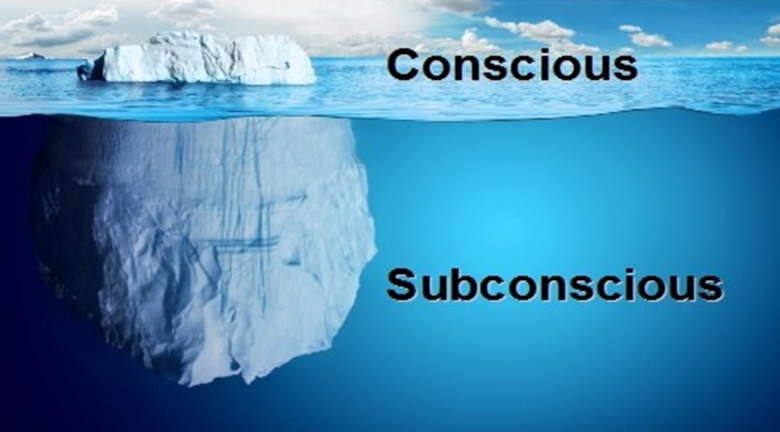Exploring Consciousness, Ego, Fear, and Highe...
Exploring Consciousness, Ego, Fear, and Higher States of Awareness for Personal Growth.
The Law of Attraction states that your emotional state determines what you attract into your life. The subconscious mind plays a major role in determining your emotional state, which in turn affects your thoughts, actions, and ultimately your results. Once you understand the power and role of the subconscious mind in comparison to the conscious mind, you can begin to eliminate the limiting beliefs, repressed traumas, and negative emotions ingrained within it. By doing this, you will be able to achieve the desired results. To gain a better understanding of the magnitude of the subconscious mind, consider the analogy of an iceberg. The crescent-shaped tip of an iceberg that is visible above the water can be compared to the conscious thinking part of the mind, while the submerged part can be likened to the subconscious mind. The image below illustrates the difference in size between the subconscious and conscious mind.

As humans, we have been conditioned to settle only for what we can perceive with our senses. We are further also only too eager to accept things based on what we believe to be true. Your subjective beliefs influence how you perceive things, potentially limiting your ability to see the bigger picture and understand the truth of a situation. It is estimated that the subconscious mind makes up roughly ninety-five percent of a person’s overall mental capacity, while the conscious mind accounts for the remaining five percent.
Everything that you have ever heard or experienced since conception is recorded and programmed into the subconscious mind. It forms your frame of reference and determines your perceptions and actions. It can be compared to programs installed on a computer. Fortunately, just like a computer, it is possible to modify the programming of the subconscious mind. This, of course, assumes that you have the desire to do so. By replacing the subconscious beliefs that limit you from reaching your true potential, you can transform your life. This process enables you to change the way you perceive life, yourself, others, and the world, resulting in enhanced outcomes in all aspects of your life. When you change the way you look at things, the things you look at change. The subconscious mind can be compared to a vault where all memories, emotions, beliefs, habits, behaviours, and values are stored. By changing those subconscious beliefs that limit your abilities to see things as they truly are, you gain new insights, greater clarity, and an overall higher level of awareness. You can then rewrite your life story and create a life filled with happiness, prosperity, and achievement. With subconscious rewriting, you can learn to rewire your thoughts, thinking patterns, and behaviour. You can consciously choose how to react and respond to external influences, and live an empowered life. This process involves breaking down old, limiting beliefs and replacing them with positive ones. You can develop new perspectives and change your perceptions to create a more fulfilling life where enhanced mental and emotional well-being are characteristics.
The neurological pathways in the body also contain subconscious programs that can impact the entire nervous system. Every neuron can be compared to a hologram that creates a mirrored image, representing the neural network throughout the entire body. According to quantum physicist David Bohm, this holographic image contains approximately ninety percent of the information stored in the subconscious mind. He refers to it as an "implicate" order, in which everything is interconnected. All of our memories, emotions, habits, subconscious programming, and instincts are stored throughout our entire neurological system and have an impact on it. If you have any unresolved trauma or negative emotions, such as anger, frustration, sadness, fear, hurt, doubt, hate, shame, anxiety, guilt, or limiting beliefs about yourself, they not only affect your thoughts but also your entire neurology. Repressed negative emotions and traumas are the primary driving forces behind unwanted behaviours, addictions, and diseases. These unprocessed negative emotions and traumas are referred to as engrams, which can be described as follows: "An engram is the cognitive information of an event or events imprinted in the subconscious mind and neurology." Essentially, an engram is a unit of cognitive information that is imprinted in the human body as biophysical or biochemical changes in the brain and neurology in response to external stimuli. The engrams associated with negative content can be compared to containers filled with toxic substances. If these "containers" are not removed from your system, they will eventually start to leak and spill their toxic content into the body which will cause disease. To prevent repressed negative emotions and traumatic experiences from harming the body, it is necessary to release and let go of them. Remember, repressed emotional trauma and negative beliefs are not your fault. You were merely an innocent bystander who experienced them. Healing, however, is your responsibility, especially if you have a desire to transform your life.

Juan Esterhuizen Life Enrichment Coach, Counsellor and Mentor provides an empathetic compassionate and confidential space in a safe and private rural environment where you can freely discuss your thoughts, feelings, emotions and experiences. His approach is person-centred and solution-focused. Take ...
View ProfileXplorio is your local connection allowing you to find anything and everything about a town.
Read MoreExploring Consciousness, Ego, Fear, and Higher States of Awareness for Personal Growth.
Our work and the workplace can be sources of great joy and achievement for us.
We have all had experiences where everything just worked out perfectly despite the odds.
Everything in the universe is in constant flux and constantly in motion, regardless of whether it is a solid, liquid, or gas.
The Law of Relativity states that each person is presented with a range of tests that act as tests of initiation.
There are times when we feel trapped and helpless, unable to deal with the problems of our daily lives.